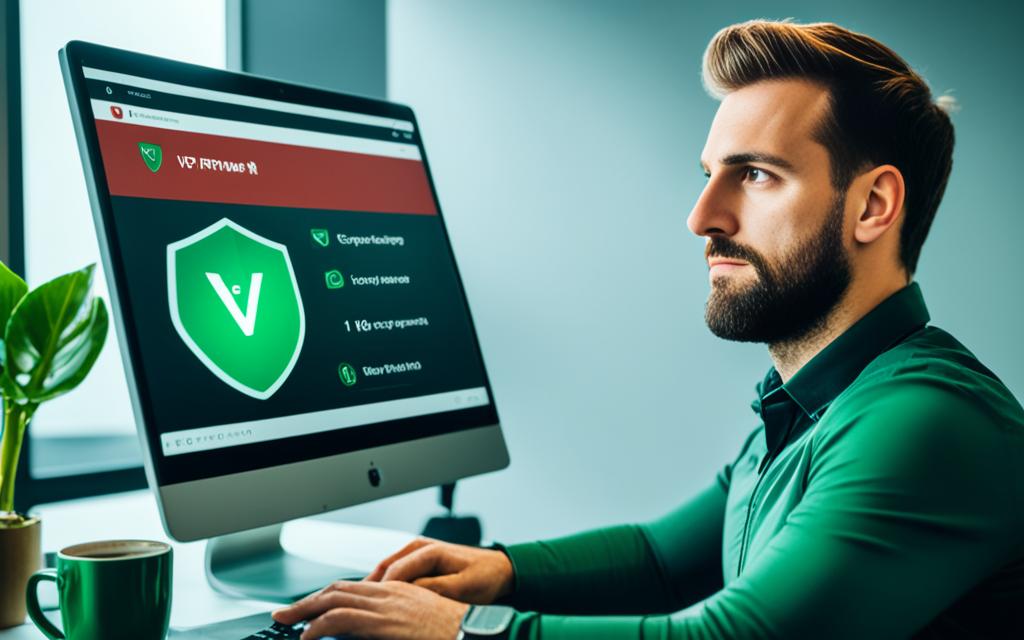How to Check If VPN Is Working: Simple Guide
How to Check If VPN Is Working? In today’s digital world, keeping my online activities private is key. Virtual Private Networks (VPNs) help protect my internet use and encrypt my connection.
But just having a VPN doesn’t mean it’s working right. It’s important for me to check if the VPN is working well, as about 7 percent of people use VPNs for torrenting1.
This guide will show me easy ways how to check if VPN is working, making sure I surf the web safely and keep my online privacy.
Understanding the Importance of a Working VPN
Having a working VPN is key for safe online use. It encrypts your internet traffic, keeping your data safe from hackers. With 1% of VPNs having IP leaks, making sure your VPN works right is crucial for privacy2. A good VPN also lets you access content blocked in your area.
About 3% of VPNs might leak DNS, showing your browsing and location. This is why VPNs are so important, they protect against data breaches2. WebRTC leaks affect 2% of VPNs, showing how important strong VPN protocols are for safety.
Knowing how important a VPN is makes me check my connection often. This keeps me safe online and lets me access more of the internet2. Choosing a trusted VPN service cuts down risks, as bad choices cause 10% of VPN problems2.
Signs That Your VPN Is Functioning Properly
Using a VPN, I look for certain signs to make sure it’s working right. A big clue is seeing my IP address change after I connect. This tells me my real identity is hidden. I also check if I can access content that’s blocked in my area, which should work smoothly with a good VPN.
Seeing steady upload and download speeds is another key sign. If these speeds are what I expect, it means my VPN is doing its job well.
Another good sign is seeing a “Connected” status in the VPN app. This shows the connection is secure and working right. Plus, not having any sudden drops in my internet while using the VPN tells me it’s working as it should. Watching for these signs helps me avoid being unhappy with my online security345.
| Signs of VPN Functionality | Description | Importance |
|---|---|---|
| Changed IP Address | Visible IP change confirms VPN is masking my real address. | Essential for anonymity. |
| Access to Restricted Content | Ability to view geo-blocked content indicates successful connection. | Provides access to a broader internet. |
| Stable Speeds | Consistent upload and download speeds signal a well-working VPN. | Indicates reliability and performance. |
| Connected Status | Status within the app shows an active connection. | Reassures that the VPN is operational. |
How to Check If VPN Is Working
To check if your VPN is working, start with a few easy steps. First, make sure your VPN is hiding your IP address.
Checking Your IP Address
First, turn off your VPN and go to a trusted IP checker like whatismyip.com. Note your current IP address. Then, turn your VPN back on and check your IP again. If it’s different, your VPN is working right. In places where VPNs are heavily restricted, making sure your IP is masked is key to keep your data safe6.
Verifying VPN Status
Your VPN app should show if you’re connected. Look for a green light or the word “Connected” to see if you’re online. If you see signs of a problem, you might need to fix it. Checking your VPN software often helps find issues, especially with the right fixes7.
Running a Speed Test to Evaluate VPN Performance
Testing my VPN speed is key to knowing how it changes my internet. VPNs might slow down your internet a bit because of encryption and data rerouting. This effect is often worse with free or less trusted VPNs that don’t have many servers8. To check how well a VPN works, I connect to a server and use tools like Ookla’s Speedtest or Fast.com8. I look at ping, download speed, and upload speed9.
After testing with the VPN, I test again without it to see the difference. A big change in download speed shows if the VPN is good for me10. For everyday internet use, an upload speed of about 5 Mbps is good. It’s important to watch this during my tests8. I also think about how far the server is and how busy it is. Servers that are far or very busy can make your internet slow10.
If the VPN makes my internet too slow, I might try different server locations or security settings8. Closing apps I don’t use and using a wired connection can also make my internet faster8. With top-notch VPNs, I expect only a small slowdown, especially if they have lots of features and servers9.

Common Issues: Why Your VPN Might Not Work
Sometimes, I run into problems with my VPN, like server issues and DNS leaks. These problems can really mess with my online activities. Let’s dive into these common issues to see how they might affect my VPN.
Checking for VPN Server Connectivity
When my VPN isn’t working right, I check the server connection first. VPN servers can go down or have connectivity problems, which stops me from connecting11. If a server is down, I switch to another one to see if the issue is still there. It’s smart to know that certain ports must be open for the VPN to work, like port 500 for UDP or port 443 for TCP11.
I also restart the VPN app to try and fix the problem. Sometimes, this creates a new connection and makes things more stable. If the issue keeps happening, reinstalling the latest app version might fix bugs or security issues11.
Identifying DNS Leaks
DNS leaks are something I also watch for. A DNS leak happens when my DNS queries go around the VPN, showing my real IP address. I use tools to test if my connection is safe from leaks. It’s important to make sure my DNS settings are right to keep my online activities private.
Simple steps like clearing the DNS cache can help fix DNS problems with my VPN12. Knowing about these VPN issues helps me stay safe and efficient online.
How to Resolve IP Address and DNS Leaks
Keeping your online privacy safe is key. Many use VPNs to hide their IP address. It’s vital to know how to stop leaks. Regular DNS leak tests are a must to find security weak spots.
Methods to Prevent IP Leaks
To stop IP leaks with a VPN, keep your software updated. This fixes known issues. A kill switch is also crucial, cutting off your internet if the VPN drops, hiding your real IP. Some VPNs have DNS leak protection, lowering leak risks13.
Checking for IP leaks often is a must. Restart your VPN, check settings, and reach out to support for leaks that don’t stop. Some ISPs use transparent DNS proxy, increasing leak risks14.
Testing for DNS Leaks Regularly
Regular DNS leak tests keep your info safe. A leak can show your browsing history and location. Use special tools for leak tests to check your VPN’s security. If leaks are found, fix your VPN or switch to a better one13.
Testing for WebRTC Leaks and Their Implications
Using a VPN, I must watch out for WebRTC leaks that can reveal my real IP address. Even when the VPN is on, these leaks can expose me. To check, I disable the VPN and visit a leak testing site. If my real IP shows up, I’ve found a leak, which is a big privacy issue15. Sadly, some VPNs don’t block these leaks, which worries me15.
Many browsers like Firefox, Google Chrome, and Opera are more likely to have these leaks15. Keeping my online privacy safe is crucial. I can use browser extensions like WebRTC Leak Prevent to manage WebRTC settings16. For instance, in Firefox, setting “media.peerconnection.enabled” to “False” helps keep me private16.
It’s key to regularly check my WebRTC settings to keep my identity safe. Luckily, top VPNs have passed WebRTC leak tests, giving users confidence15. But, third parties can use WebRTC to find my real IP address, showing why I must always test and watch my connection15.
| Browser | Method to Disable WebRTC |
|---|---|
| Chrome | Use WebRTC Leak Prevent extension |
| Firefox | Change “media.peerconnection.enabled” setting to “False” |
| Safari | Disable “WebRTC mDNS ICE candidates” in Experimental Features |
| Microsoft Edge | Enable “Hide my local IP address over WebRTC connections” |
| Opera | Disable “Disable non-proxied UDP” in WebRTC settings |
Assessing Your VPN for Malware Risks
Checking VPN apps for malware risks is key. It’s important to look for VPNs with a strong cybersecurity record. I check user reviews to see if there have been malware issues with a VPN before.
A Verizon report found 76% of network breaches came from stolen user info17. This shows why it’s crucial to check my VPN for security. I use tools like VirusTotal to check for malware before installing my VPN.
It’s important to keep an eye on my VPN for any signs of malware. I watch my network traffic for anything odd. This helps me stay safe online.
Being careful with VPNs means more than just trusting them. It means checking them regularly and using safe practices. With many VPNs owned by companies under weak privacy laws, I must be careful18. Keeping my VPN secure is key to my online safety and privacy.
FAQ
How often should I check if my VPN is working?
What should I do if my VPN won’t connect?
Can using a VPN slow down my internet speed significantly?
How can I tell if my VPN is leaking my IP address?
What are DNS leaks, and how can I prevent them?
What are the risks of using a VPN with malware?
Is it safe to use free VPNs?
How do I disable WebRTC to protect my IP address?
How can I test for WebRTC leaks?
Source Links
- https://www.security.org/vpn/test/
- https://nordvpn.com/blog/check-vpn-working/
- https://www.forbes.com/advisor/business/how-check-vpn-working/
- https://allaboutcookies.org/is-my-vpn-working
- https://www.avast.com/c-check-vpn-working
- https://www.zdnet.com/article/how-to-check-if-your-vpn-is-working-and-what-to-do-if-your-vpn-wont-connect/
- https://support.apple.com/en-us/102281
- https://www.ipvanish.com/blog/vpn-speed-test/
- https://nordvpn.com/blog/vpn-speed-test/?srsltid=AfmBOoo_E1CW9eCzlI9Mv81QZDB4YU4aVv8B6iPCXMRj9axv70RfPLSL
- https://surfshark.com/blog/vpn-speed-test
- https://nordvpn.com/blog/vpn-not-connecting/
- https://www.forbes.com/advisor/business/vpn-not-connecting/
- https://www.globalsign.com/en-sg/blog/is-my-vpn-leaking-my-ip-address-on-my-smartphone-or-tablet
- https://www.pandasecurity.com/en/mediacenter/is-my-vpn-working/
- https://www.security.org/vpn/webrtc-leak/
- https://nordvpn.com/blog/webrtc/
- https://www.imprivata.com/blog/vpn-problems
- https://quicksmart-it.com/tech-insight-how-to-check-your-vpn/




